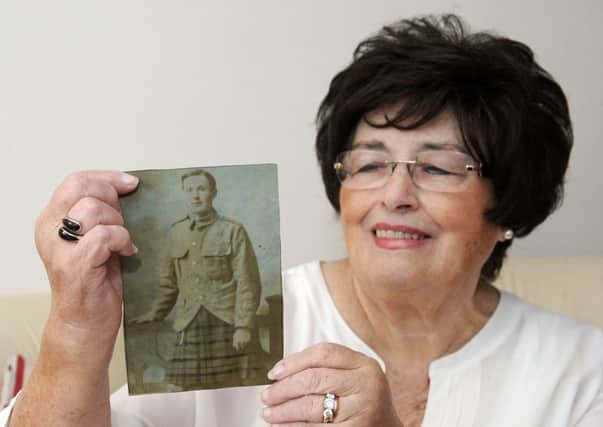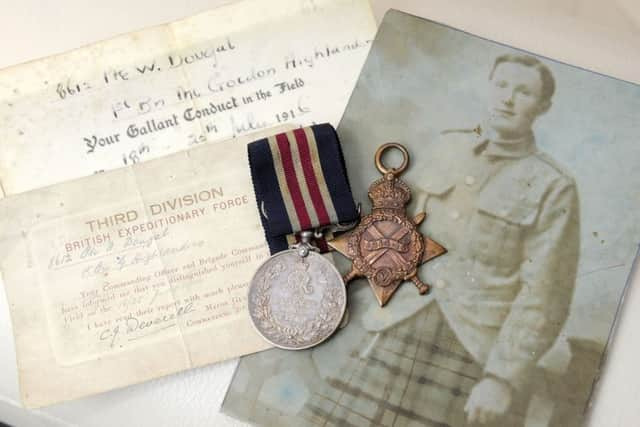The quiet man from Camelon who was a wartime hero


Now the feat which led to him being awarded the Military Medal has gained fresh significance.
In November we mark the end of the conflict that was supposedly to end all wars.
Advertisement
Hide AdAdvertisement
Hide AdWilliam Dougall’s claim to fame is that he was awarded the Military Medal for gallantry in the field during the desperate Somme operations of summer 1916.


Specifically he had rescued a wounded officer, bringing him safe back to British lines under heavy enemy fire. After the war his colleagues at the Carron Iron Works presented him with a Bible as a token of their esteem.
William worked for no less less than 50 years as an iron mould caster at the famous Works, retiring in his 70s.
Brought up in Laurieson, he married at the age of 26 in 1922 and spent a long and happy life with his wife Sarah (four years his junior) and their family in Camelon. He passed away in 1978, aged 83.
Advertisement
Hide AdAdvertisement
Hide Ad“Dad never talked much about the war, and I was too young to understand what it was all about then anyway,” says Isobel – who treasures a colour-tinted picture of William in the uniform of his famous Scottish regiment.
She is proud – and a little in awe – of this “quiet, unassuming man” who decided to march off to war in 1916.
“I remember he had one very nasty scar – he had leg wounds,” says Isobel.
“When he did talk about the war it was about a Christmas truce when they threw Woodbine cigarettes over to the Germans.
Advertisement
Hide AdAdvertisement
Hide Ad“They must have thrown gifts back in reply, but I don’t know what they were.”
She adds: “Then one New Year he got emotional – he sang a song from the war, and wiped tears from his eyes.
“Much later, learning what these men went through in the trenches, I realised that was my dad’s story too – although you can never really grasp what it must have been like.”
The Gordons men faced the ever-present threat of sudden death from snipers.
Advertisement
Hide AdAdvertisement
Hide AdThey endured machine gun fire, shrapnel and poison gas, and sometimes savage hand to hand combat.
“Now I’m looking at that picture and thinking that he really was one of the lucky ones,” says Isobel.
“Dad was a fit man, and never missed a day at work – he carried on well past the age you’d normally retire.”
She adds: “But when I think about what he and so many ‘ordinary’ people went through it makes me wonder about all those others I knew in my younger life. Many must have been through similar experiences, but you’d never have guessed it.
Advertisement
Hide AdAdvertisement
Hide Ad“They had seen terrible things, but seldom if ever talked about them – it just wasn’t the way in those days.”
William Dougall, just 20 when he answered Kitchener’s call, was one of tens of thousands of volunteers who flocked to the colours in the wake of the terrible casualties suffered by the original British Expeditionary Force.
In summer 1916 the British Army had launched the Somme offensive, and in the opening day of the assault lost 60,000 men, of whom around 20,000 were killed.
Arguments continue to rage about why and how the war was fought, but Isobel says she now recognises why men of her dad’s generation were different, and special.
Advertisement
Hide AdAdvertisement
Hide AdThe catastrophe which unfolded a century ago can seem pointless now, but ordinary men risked their lives for what they thought was right.
“Unless you knew, you’d never guess what he and all the others had been through,” says Isobel.
“After the war he enjoyed his gardening more than anything else. It’s all he wanted.”
The 1st Battalion of the Gordon Highlanders landed at Boulogne in 1914, and along with many other Scottish units (including those raised in England and Canada) saw heavy service throughout the war.
Advertisement
Hide AdAdvertisement
Hide AdThe army which stopped the Germans in their tracks in 1914 and 1915 nevertheless took staggering losses, and – realising hopes of a short war were groundless – Lord Kitchener issued his famous “Your Country Needs You!” call for volunteers. This may have been the point at which even those working in important war industry occupations often decided to join the colours.
By that time they would be painfully aware of the steady stream of casualties coming back from the Front.
Local men would have read in The Falkirk Herald of local men killed, captured or wounded, and of the desperate need for reinforcements.
Far from being people enamoured with the supposed glamour of war these 1916 recruits were sober-minded citizens who, in a patriotic age, simply felt it their duty to fight for king and country in an hour of great national need.
Advertisement
Hide AdAdvertisement
Hide AdThe Gordon Highlanders raised no less than 21 battalions, each of 1,000 men, during the war. More than a third – 8,870 men – were killed, even before the many wounded are considered.
Losses on such a scale had never been contemplated before 1914, but were to become sickeningly routine.
Old-school generals struggled to come to terms with the grim realities of modern warfare.
Unspeakable carnage ensued.